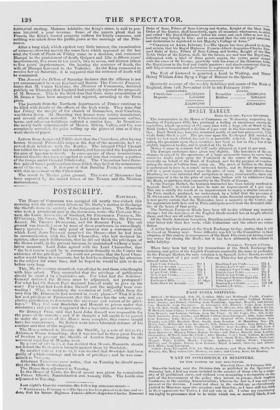The House of Commons was occupied till nearly two o'clock
this morning With the adjourned debate on Mr. Darby's motion to discharge the Sheriffs front the custody of the Sereennt-at-Arms. The Members who took a prominent part in the discussion, were—Sir EntwAny SEGDEN, the LORD A IkVoCATE of Scotland, Sir FREDERICK POLLOCK, Mr. O'Consem„ Mr. Suuaw, Mr. Wvxx, Lord JOIIN ltussEm„ Mr. FITZROY RELLY, Mr. TnomAs DuseonnE, and Sir ROBERT PEEL. The old ground was travelled over by most of these gentlemen, in exceedingly heavy speeches. The only point of' interest was a statement with which Lord Jou:: lirssma. surprised. the House—tbat he had 'been in communication with the Lord Chancellor, who bad declared his opinion, after much deliberation, that Ike did not think the privileges of the House could, in the present instance, be maintained without a legislative measure. Lord John agreed with the Lord Chancellor, that " the best course would he to communicate formally to the Courts the existence of the privilege." lie could not promise that the Lord Chancellor would bring in a measure, but he had heen directing his attention to the subject for some time, aud he hoped Ile would be able to do an before very long.
'rids, Mr. Di:NCO:M.1E remarked, was all that he and those who thought -with him asked. They contended that the privilege of publication should be secured by a legislative act. For what had the Solicitor. General declared. the Houses must be adjourned, not prorogued ? For what had Sir Robert Peel declared himself ready to give up his Scat? For what had Lord John Russell and the majority been contending ? Why, to maintain the resolution of 1637, which from the very first Mr. Duncontbe had resisted in every phase—" That it is the law and privilege of Pesti:1111(ml-, that this House lets the sole and exclusive jurisdiction to determine the existence ant extent of its privileges." They kal. sent Stockdale and lloward to prison under that resolution ; and yet now it appeared that a legislative act was necessary. Sir ItonEwr P KM, said that Lord John Russell Was responsible fbr the peace of the country ; and if' Ire thought a hill ought to be passed to make the powers of the House more complete, that course should have his concurrence. Sir Robert went into a laboured defence of his conduct and that of the majority.
The I louse refused to liberate the Sheriffs, hy a vote of' 165 to 94 ; Alderman Wow, remarking, that it was too bad in these great friends of freedom to prevent the Sheriffs of London from joitting in the universal rejoicing of Mcnday eat. By a vote of' Its to it was decided that Messrs. humanism should not defend the fresh action ',sought against them by Stied:dale. By another vote or 132 ti 34, it was decided that Stoekdale had been guilty of a high contempt and breach of privilege ; and he was committed to Newgate.
Alderman TI10a Pia*: gave notice, that on Tuesday he should move that the Sheriff"; be discharged.
The House then adjourned to Tuesday.
In the House of Lords, the Royal assent was given by commission to Prince Albert's Naturalization and Annuity Bills. The Lords also adjourned to Tuesday.


























 Previous page
Previous page